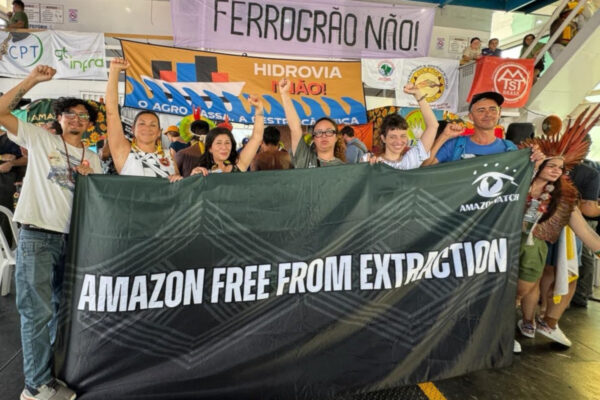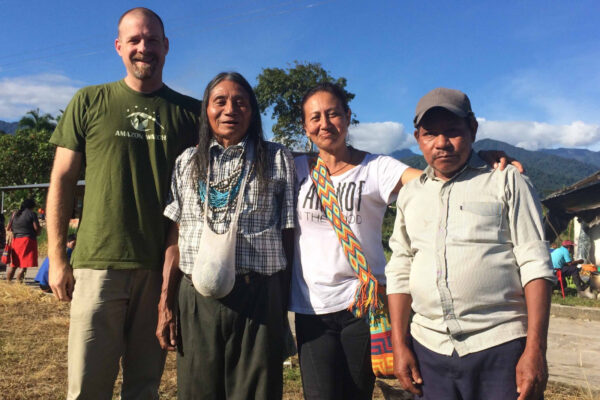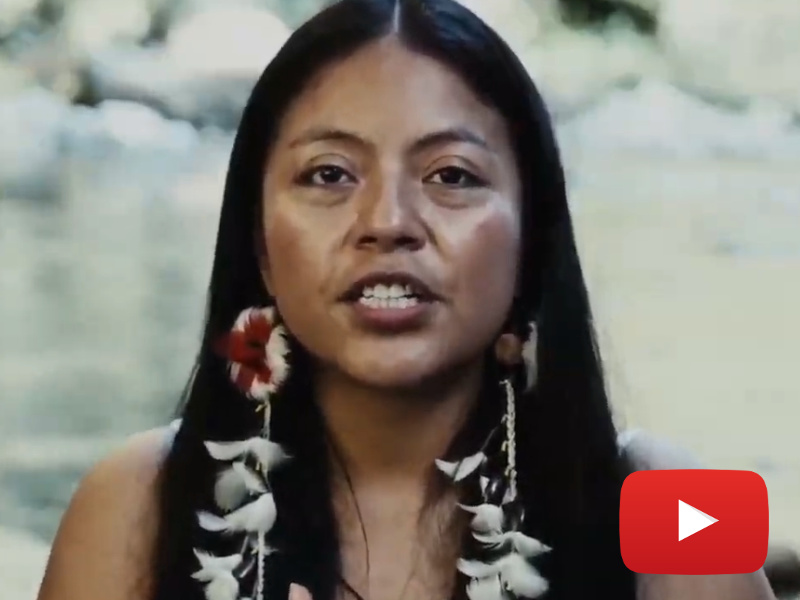(Cancun, Mexico) – Civil society spokespeople representing a coalition of more than 100 organizations in 20 countries are arriving in Cancun this week for the Inter-American Development Bank’s annual meeting, looking for answers from the Bank’s governors and management on a 26-point reform agenda on which any capital increase should be conditioned. Key reforms are needed in areas of climate and sustainability, regional integration, and managing for results.
What began at last year’s annual meeting in Medellin as an urgent plea by the Bank for a capital increase for up to $200 billion, has now been whittled to as little as $50 billion due to crumbling confidence in the bank’s capacity to reform itself.
The Bank has agreed to hold a series of meetings between Civil Society delegates and high-level Bank officials and governors during the annual meeting.
Following meetings with Bank officials and delegations, the civil society delegation will hold a media briefing on Sat., March 20 at 4 p.m. CST – Convention Center level 1, offices P29 & P30.
Inter-American Development Bank (IDB) financing in 2009 totaled $15.9 billion – an increase of some 42% more than the $11.2 billion lent in 2008 – as a response to the financial crisis. To sustain higher level of lending, the six principal multi-lateral development banks are simultaneously asking member countries for general capital increases (GCIs), which would be a mix of paid-in and callable capital.
Since Medellín, the IDB’s Board of Governors has convened three times to discuss the capital increase proposal in Santiago, Chile (July 2009), Madrid, Spain (October 2009) and Washington, DC, USA (March 2010). Over the course of this process, a coalition of civil society organizations has raised a series of concerns, starting with several detailed reform proposals in the areas of sustainability and development effectiveness a in June of 2009. Most recently, on February 17, 2010, a group of more than 100 civil society groups from 20 countries echoed those unanswered concerns and recommendations in a letter to their respective Governors, detailing a series of 26 concrete recommendations for reform that the Bank should implement prior to receiving any new funds. Of the 48 IDB governors, so far only one has formally responded to civil society’s call for reforms.
Whatever agreement is reached in Cancun will be provisional, given the legislature in each donor country would still have to approve any capital increase. For several donor member countries, no new funding could be made available until early 2012. The civil society coalition has vowed to continue to sound the alarm within member countries on the Bank’s glaring lack of accountability and to call for crucial reforms.
KEY REFORM AREAS
(1) Management for Results
The IDB is unable to demonstrate evidence-based results from the last capital increase in 1994. Nearly three out of every four IDB projects fails to pass minimal quality design criteria. An equal number of project evaluations fail to meet these standards. Despite efforts to revamp its results framework, the IDB lacks a coherent, complete and robust results framework. Unless the internal incentive structure is retooled, beginning with performance evaluations for the Bank’s upper management and a stronger accountability for results, the IDB will continue to conflate effort with achievement and sidestep the reforms necessary to meet the next generation of development challenges in Latin America.
• “Without an airtight covenant to produce evidence-based results, the IDB should be last in line behind the other MDBs in consideration for a ninth GCI.” Vince McElhinny, Bank Information Center – BIC (USA) e-mail: [email protected]
(2) Climate Change / Sustainability
The IDB promotes itself as a “green bank”, yet much of its recent lending strategy (infrastructure mega-projects contributing to greenhouse gas emissions from land-use change) has been at odds with that notion. Fossil fuel operations continue to dominate IDB energy lending with less than 10 percent of energy portfolio going to renewables. Though the Bank was mandated to conduct a review of its Environmental and Safeguards Compliance Policy in 2009, this hasn’t happened, much less been incorporated into the GCI proposal. The Bank continues to lack a comprehensive strategy for addressing climate change.
• “In the next three years, the IDB should dedicate 40% of its energy lending to renewables and completely phase out lending for fossil fuels” Paulina Garzón, Amazon Watch (USA) e-mail: [email protected]
(3) Alternative Regional Integration
While the IDB is an institution whose principle objective is to promote the integration of the Americas, the Bank still lacks clear integration objectives nor has indicators to measure its value added in this area. Apparently not having learned the lessons from a failed FTAA and slow to respond adequately to the profound changes evident in the hemisphere, the Bank continues to promote an integration model such as IIRSA that emphasizes trade almost exclusively, and is in reality rejected by most people in the region. Unless the IDB consults widely with actors across Latin America regarding the preferred model of integration, the new strategy being prepared is likely to lack the innovation necessary for the Bank to become a catalyzing force for regional integration.
• “The IDB must recognize that there is a new search for integration that doesn’t have as its principle objective to intensify trade but that people are able to live well. Otherwise, it will remain marginalized.” – Margarita Florez, ILSA (Colombia) [email protected]
OTHER IMPORTANT REFORM AREAS
Consultations with Civil Society: Responding to pressure from civil society organizations, the IDB carried out a consultation process previously unheard of as part of an MDB GCI request. Over three months in late 2009, the Bank held seven meetings and four teleconferences. The unprecedented nature of the consultations aside, they were deficient in at least two ways: One, the Bank failed to provide updated versions of crucial documents, including the GCI proposal, the Results Framework, or evaluations of the Bank’s realignment of 2007; and two, there have been no follow-up discussions about how civil society proposals have been incorporated or not into the GCI process.
• “The Bank’s satisfaction with the GCI consultation process, measured mostly in the number of participants, contrasts with our frustration with what we felt was an empty process, a ‘dialogue of the deaf’.” María José Romero, Instituto del Tercer Mundo – ITeM (Uruguay) e-mail: [email protected]
Information Disclosure Policy: Since 1994, the IDB has created and modified its information disclosure policy several times. This current policy is incomplete and has numerous shortcomings. In many cases, information is only released after relevant decisions are made,, severely limiting informed, timely, and substantial participation on the part of civil society. Additionally, the policy allows for exceptions in cases of “confidential” and “delicate” information, the definitions for which are overly subjective. Finally, the policy lacks an independent appeal mechanism for decisions to withhold information. Civil society recommendations include building on the World Bank’s recently updated disclosure policy that incorporates key principles from the Global Transparency Initiative’s Transparency Charter and facilitating a broad participation of civil society in the revision of the policy, publishing updated versions of the draft policy as they are available internally.
• “The revision of the IDB’s information disclosure policy should be linked to its current GCI process. Both initiatives should go hand in hand, given the essential nature of information in allowing substantial participation.” Gonzalo Roza, Centro para los Derechos Humanos y Ambiente – CEDHA (Argentina) e-mail: [email protected]
Whistleblower Protection: IDB management is circulating a new whistleblower protection policy to the Board of Directors for approval. At the same time, senior managers are actively concealing a process of retaliation against a whistleblower who repeatedly reported corruption in the Office of the Auditor General. The whistleblower began to report misconduct and improper expenditures in that office about eight years ago, and in 2007, was forced out of the Bank on terms that he is contesting. Internal IDB documents obtained by the Government Accountability Project demonstrate that the Bank’s failure to renew this individual’s contract was in retaliation for his whistleblowing activities. Given that IDB management does not enforce the existing anti-retaliation policy, whistleblowers should have access to an external legal forum to investigate their disclosures and expose retaliation when it occurs.
• “Instead of a new policy that is also not enforced, whistleblowers need real protection from retaliation, strict confidentiality for witnesses, and transparency about terms of employment.” Beatrice Edwards, Government Accountability Project – GAP (USA) e-mail: [email protected]
Accountability Mechanism: One positive development is the recent approval of a new accountability mechanism for the IDB, which gives people and communities that believe they have been harmed by the Bank’s lending a means of bringing forth complaints. On February 17, the Board of Directors approved the Independent Consultation and Investigation Mechanism (ICIM). This new mechanism replaces the previous Independent Investigation Mechanism, which had languished since its establishment after the Bank’s 8th GCI in 1994. Many of civil society’s suggestions were included in the final ICIM policy. For example, the final policy improved the independence of the mechanism by creating a separate office instead of being housed within the Office of the Secretary, as was proposed, and includes a new position for the consultation phase, the Project Ombudsperson. Another positive change is the inclusion of emergency and policy-based loans within the scope of the mechanism.
• “Reforming the IDB’s accountability mechanism was an important step forward. But only when the first complaint arrives, will we know how serious the IDB really is about being held accountable.” Kristen Genovese, Center for International Environmental Law – CIEL (USA) e-mail: [email protected]
#













